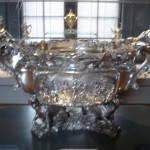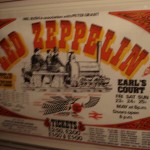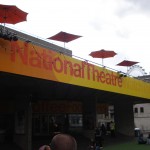September 14th, 2010 · 1 Comment
When President Durden asked us whether we had seen any aspects of London that changed our views of what we want from life, I, like many others, thought of the fantastic access to the arts here. This has been manifested for me in all of the free museums and especially in the reasonable prices of theatre tickets on the West End. I came to London knowing that I wanted to go the theatre as much as possible, and I set aside a significant portion of my meager summer earnings (unpaid internship–ouch) for that purpose. I’ve been lucky enough to see five shows in London so far: The Merry Wives of Windsor, Billy Elliot, Bedlam, Les Miserables, and The 39 Steps. Although I sat in the very back row of the theatre for Les Mis and had a railing in my line of sight during Billy Elliot, I was able to purchase tickets for twenty pounds and twenty-seven pounds, respectively. If I tried to see so many shows, especially big name musicals, in the States, I would probably have no money left, so that’s been really fantastic.
I’m fairly predisposed to like theatre productions (I kind of enjoyed Bedlam, actually), but since hearing Rick Fisher speak I’ve started to evaluate the nature of the shows that I’ve seen differently, especially the two musicals. Les Miserables and Billy Elliot both draw in a lot of tourists, but I had very different reactions to these two shows. Les Mis is an epic show; there’s no other way to say it. It’s full of famous numbers that showcase the performers’ abilities to belt out big choruses and really high notes, one song after another. There are incredible set pieces and dramatic lighting cues up the wazoo. It’s an extremely showy piece. I don’t want to call it glitzy because so much of the drama comes from the violent deaths of various characters, but I think that it’s very aware of what audiences want. This is not a bad thing at all, and it certainly seems to have worked for the production. Personally, though, I found it hard to connect with the emotion of the show because I was just waiting for the next show-stopping number and Rick Fisher’s voice was in the back of my head. I thought that it was indulgent and Hollywood-esque, and once or twice I thought, “So these are a bunch of British actors performing in a show that aks me to glorify France…what?” I had trouble connecting with the show, although I did enjoy it.
Part of my reaction may have stemmed from the fact that I had just seen Billy Elliot, which I absolutely fell in love with. Unlike Les Mis, Billy Elliot doesn’t focus on showstoppers so much. I didn’t feel like it was trying to be anything that it wasn’t–it was a more honest story. Although it doesn’t have the violence of Les Mis, it’s a grittier play because there aren’t gorgeous sets or big songs for performers to belt out. The show focuses more on telling the story at hand, the story of a young boy struggling to be himself amidst the coal strikes in northern Engalnd during the Thatcher era. Because it wasn’t as pretty as Les Mis, I thought that the emotions communicated in Billy Elliot were more raw and easier to conncet with, to the point that I shed some tears during a few points in the performance.
The honesty that I loved in Billy Elliot was definitely embodied in this afternoon’s performance of The 39 Steps, which I loved. To work as a spoof, the show had to be completely aware of where it was coming from, and it also couldn’t pretend to be anything bigger than it was. I thought that the show successfully took on not only the Hitchcock movie, but also theatre and Englishness in general. It was almost as though Kate Fox was consulted on the rules of Englishness while the play was being adapted. Think of the two men in the train who were constantly saying, “‘Scuse me, sorry! Sorry, ‘scuse me!” The entire show was about being able to laugh at oneself and at the national character. Based on Kate Fox’s descriptions, I thought that it was just so English. And we saw it in a beautiful, intimate theatre, which definitely contributed to the atmosphere. I thought that it was hilarious and very well-performed.
So, Les Mis disciples, please don’t hate me because I really enjoyed that show, but I found the emotional and/or comedic honesty of the other two shows more easily accessible.
Tags: 2010 Holly · Theatre
-

-
Giant Silver Punch Bowl at the V&A
-

-
The Theatre and Stage Exhibit at the V&A
-

-
Brandon and I before Arcadia
-

-
Outside the National Theatre
This Monday I experienced my first bank holiday. Because of our full schedule here this month it didn’t seem any different from any other day here. This held true until I wandered down Tottenham Court Road and realized that just about everything was closed. With just a handful of museums open I decided to use the time to visit one I hadn’t been to yet: The Victoria and Albert Museum.
I had been told great things about the V&A museum by classmates who had been there within the past few days so I went in with pretty high expectations. After seeing the first exhibit based on Great Britain from the 1600’s-1800’s I was not impressed. Boy would this opinion change. I walked up to the first floor and entered a giant gallery filled with all kinds of sculptures. This was easily the best sculpture gallery I had seen so far in London and I spent about 15 minutes walking through it and admiring. As I continued to walk through the entirety of the first floor I was absolutely astounded by the variety of exhibits this museum had to offer. Some highlights included a detailed exhibit on fashion, a room filled with giant monuments including a cross and decorative pillars and an exhibit on the Middle East and its textiles.
After a good hour spent on the first floor I ventured up to the third floor of the museum. As soon as I stepped into the silver exhibit I was in awe. I spent at least a half an hour admiring and studying silver used and manufactured in different time periods and parts of the world. My favourite was a giant punch bowl made entirely of silver. There were many other exciting exhibits on the third floor including one on theatre and a print exhibit featuring one of my late grandmother’s favorite authors, Beatrix Potter. My last stop on the third floor was the jewelry exhibit. In addition to being aesthetically pleasing the exhibit featured a timeline of jewelry that was considered fashionable since the start 18th century and a few small personal collections.
I could have spent at least another three hours in the Victoria and Albert museum but I decided to hold off for another day. The thing that impressed me the most about this museum was the variety of exhibits. Just about every other museum I had visited so far in London I knew what to expect going in. The V&A featured anything and everything and had no qualms about doing so. I found this both refreshing and exciting.
The rest of my bank holiday was filled with a trip to the theatre. Upon request the entire class got “dolled up” for a performance at the Duke of York’s Theatre near Leicester Square. We saw Arcadia, a Tom Stoppard play that turned out to be both extremely funny and thoughtful. The class seemed a bit skeptical of how the play would be at first glance since we couldn’t see much of the stage but as soon as the curtain went up things improved immediately. Neil Pearson’s performance as Bernard Nightingale was unmatched and fit perfectly with Samantha Bond’s character of Hannah Jarvis. The play was not only entertaining and made me think but also fit in perfectly with our program since it contrasted the humanities and sciences.
Ever since seeing Troilus and Cressida last Friday I have been craving anything to do with the theatre. This happened to be perfect timing as we spent all of Tuesday focusing on the stage. In the morning we had a fantastic conversation with Rick Fisher , a Dickinson alum of 1979 and a recipient of two Tony Awards, most recently for his work on Billy Elliot: The Musical. It was fascinating speaking with a Dickinson graduate who had simply worked his way up from the very bottom of the London theatre scene.
In the afternoon the class toured the National Theatre. Our tour guide took us through all parts of the building including the three main theaters. The Olivier, which is the largest, seats about 1100 people and does not have a bad seat in the house. My favorite part about the Olivier was that the main stage could be divided in half and raised and lowered at any time. In addition to the Olivier we also viewed the Cottesloe Theatre a black box that has the capability of being transformed into just about anything. All of the chairs in front of the stage can fold down and the risers they sit on can be pushed in creating additional stage space. The tour guide described a play that had been recently performed in the Cottesloe where the actors were mixed in with the audience. This amazed me. We also viewed the Lytellton Theatre where our class will be viewing the Pitmen Painters together next week. The other part of the tour that really amazed me was the props department. From the crocodile in Peter Pan to a severed head no prop was impossible to create.
After the tour of the National Theatre many of us were so excited about coming back that we decided to go see Shakespeare’s All’s Well That End’s Well, the play taking place in the Olivier currently. My reaction to the play was mixed. The theatre itself was amazing. The props, sets and lighting blew my mind and the acting was good overall. Despite all of these positives I didn’t particularly enjoy the actual play, especially the ending. It seemed impractical to me and unlikely to happen in real life, even 500 years ago.
Overall learning about theatre in London has been a lot of fun. In addition to seeing a variety of shows we’ve gotten a chance to see London theatre from many different perspectives. From the traditional globe experience to hearing about small fringe productions from Rick Fisher to a tour of all three main facilities at the National Theatre we have received a wide perspective of how this popular activity has influenced the city as a whole and in all different ways, shapes and forms.
Tags: Henry · Museums · Theatre
September 1st, 2009 · 1 Comment
I’ve always loved performing. I danced (mostly ballet) from age 5 until I graduated high school. I also participated in a theatre camp during the summers of middle school, my best role being Sinister the Prime Minister in The Emperor’s New Clothes. I had to stop acting in high school as the play season interfered with bowling season (though I did work on the stage crew one year), and I’ve found myself too busy at Dickinson to get involved with the theatre or dance scenes in college. I often miss being on stage; therefore, I greatly appreciated today’s activities: a talk with Rick Fisher and a backstage tour of the National Theatre.
I found Mr. Fisher to be an engaging speaker and one could easily tell he loves what he does. I had never really thought about the intricacies of stage lighting before this morning. Obviously, lighting is important to any show. The audience needs to be able to see the performers. I learned this morning, though, how carefully lighting must be designed in order to set particular scenes. Natural lighting can tell the audience the time or location of the scene: night or day, indoors or outside. Different colors of light can set the mood of a scene, and flashes of light can help the audience perceive characters’ emotions. I liked what Mr. Fisher said about lighting: that the best lighting isn’t noticed, it’s just right. I feel this is exactly the way to view lighting–it completes a performance. This statement reminded me of a speech given by my high school band director. He told us that no section of a band is more important than another; without one of the sections a piece seems incomplete. He then proceeded to have us play our music without the low brass, then without the percussion. While these sections aren’t the melody of the piece, the song just doesn’t sound right without them. I feel like lighting serves the same purpose in a performance. Lighting isn’t something one might think of or notice when seeing a play, opera, or recital, but without the right lighting, a show is imperfect.
Our tour of the National Theatre was eye-opening. Walking through the building, I couldn’t possibly imagine the creativity needed to design a building to house three stages, numerous workshops, storage, etc. I loved going backstage and seeing all of the work that goes into putting on a show. We don’t always appreciate stage crews, costume designers, or prop artists. They aren’t the people we see when we attend a performance.
Today’s discussion and being back stage gently reminded me that the actors aren’t the only people that make a great show.
Tags: Sarah · Theatre
I’m going to be perfectly honest: I’ve never been a big fan of the theater. I’m the sort of person who will go see anything and be able to appreciate it or be critical of it for seemingly valid reasons, but I’ve just never really enjoyed live theater the way I do films: the choice of only one or two settings has always felt extremely limited for my wild and vivid imagination, I’m a bit hard of hearing and can’t turn the volume up on live actors, people don’t suddenly break into coordinated song and dance routines in real life, there’s a huge margin of error for mistakes and unwelcome variation between performances, and it’s much harder to blow things up and create huge messes on a stage. I’m a fan of realism and authenticity, and sometimes I just can’t suspend my disbelief with plays the way I can with movies.
All of this being said, I’ve always been fascinated by the production aspect of live theater. I was heavily involved with the production and tech crews at my high school, and I used to enjoy nothing more than Hell Week before opening night, sitting in the black box theater in the wee hours of the morning, flicking lights on and off, organizing props, and putting finishing touches on the set. After hearing Rick Fisher speak about his experience with the theater and taking the tour of the National Theatre today, I’ve started longing to go back to stage managing and tech production. I’m attempting to see as many plays as I can during our time in London in order to try to condition myself into enjoying being an audience member, but I think I will always prefer being a part of the action rather than watching it. I kind of wonder if this is a problem: enjoying working very hard towards an end product you don’t really care for.
I’ve never been an avid play-goer before this trip, but I feel as though the West End has a bit less glitz and a bit more pride than Broadway. Perhaps pride is the wrong word, and perhaps I’ve been seeing and hearing of the wrong plays, but I often think of many Broadway plays as being a good and expensive night out, but the West End seems to treat the plays as more of an art form and something that everyone should be able to enjoy and appreciate. If the advertisements on the Tube are any judge, the West End has its fair share of mindless plays based on popular movies, but the simple fact that there are cheap seats, student discounts, overwhelming amounts of Shakespeare, government funding, and seemingly many more British film and television stars on the stage as well as the screen (working for meager amounts of money) makes me believe that in England, the theater is more of a cultural institution meant for everyone rather than deep appreciation for few, or simple entertainment.
I grew excited last night upon learning that Arcadia was written by Tom Stoppard, who also wrote Rosencrantz and Guildenstern are Dead and co-wrote Shakespeare in Love. I seemed to have forgotten, however, that his work, while usually hysterical and thought-provoking, is also very dense and requires a fine-toothed comb to find all of the hidden jokes, references, and subject matters. This, coupled with the fact that I was inexplicably exhausted and that my hearing can be likened to that of a seventy-year-old man’s made me unable to completely follow much of the play, but apparently I wasn’t alone. I think reading it would make things clearer.
I’m foregoing the next performance at the Globe simply because I don’t know if my back could handle another few hours as a groundling, but I’m attending All’s Well That Ends Well tomorrow night in its stead in a valiant effort to see more plays, learn to appreciate the finished product rather than just the behind-the-scenes work, and learn to like Shakespeare.
Tags: Chelsea · Theatre




